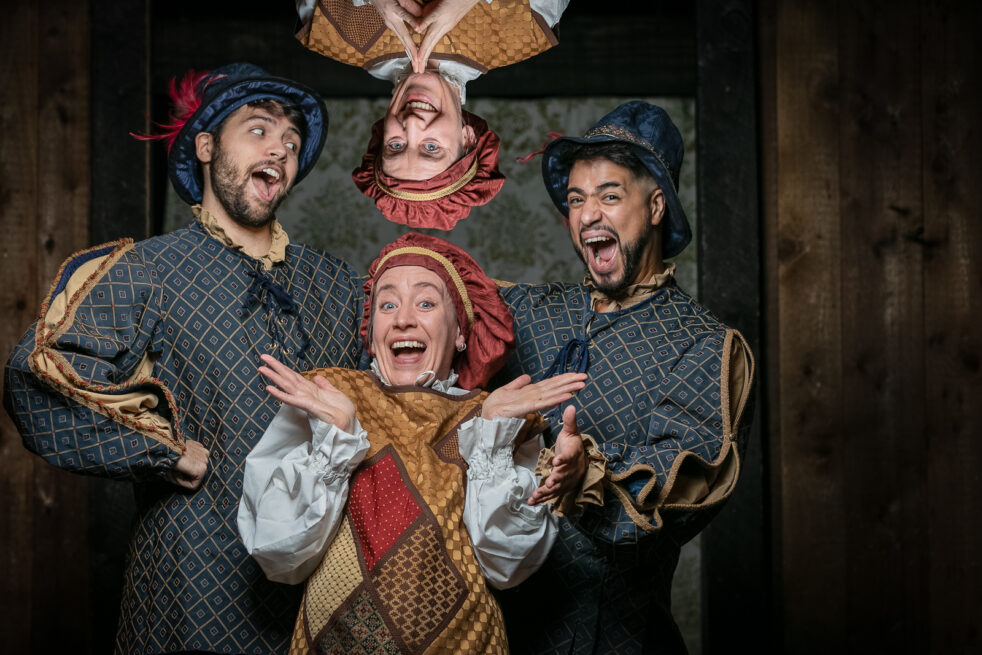Our Take: 4/5 Stars
During every curtain speech in the run of “Comedy of Errors” at the Shakespeare Tavern Playhouse, the Stage Manager delivers a shocking surprise: the fictional actor intended to play one of the lead roles is unable to attend the performance. Mary Ruth Ralston, who is already playing another leading character, must perform in their place.
In a bold decision that showcases Ralston’s talent and brings down the fourth wall of the show, we see her struggle to “learn” her lines onstage and perform as two characters in the same scene — a challenge with potential to go horribly wrong.
Ten years ago, this might not have happened on the Tavern stage. Ten years ago, the theatre scene in Atlanta and beyond looked a bit different.
In August of 2015, Lin Manuel Miranda’s Hamilton hit Broadway and reshaped what mainstream theatre could be. Casting almost every member of the principle cast as people of color, Miranda showed critics that nonwhite actors could be marketable for any role, even founding fathers.
Nearly five years later, many of these actors, along with millions of other Americans, took to the streets to protest the murders of George Floyd, Breonna Taylor and countless of other victims of racial violence.
In the aftermath of the Summer of 2020, Americans have been forced to reevaluate the effects of not only racism, but sexism, homophobia, and other prejudiced ideas in every corner of our lives — the theater is no exception.
Last year, Atlanta artist O’Neil Delapenha became the first person of color to direct a mainstage show with the Atlanta Shakespeare Company (ASC), a long overdue title reflective of the changes taking place within ASC and many other theaters throughout the nation. Delapenha’s take on Othello streamed virtually.
As the perceived danger of COVID-19 waxes and wanes with time, theatres are cautiously reopening their doors to patrons. On Jan. 8, Delapenha’s second mainstage show for the Tavern, the Comedy of Errors, opened for a live audience.
Comedy of Errors, an early play of Shakespeare, is deeply problematic. The main plot revolves around two sets of identical twins with the same names getting mistaken for each other in the town of Ephesus. The second pair of twins, Dromio and Dromio, serve as slaves for the first, Antipholus and Antipholus.
Much of the slapstick comedy of the show involves punny wordplay from Dromio, who then receives beatings from Antipholus.
What may have been amusing for an Elizabethan audience is difficult to watch from a modern lens.
However, Delapenha remolded the abusive relationship between Antipholus(es) and Dromio(s) to be one of lighthearted humor, tender affection, and loyal partnership. For once, the connection between the two is truly joyful to watch.
Another surprise to audiences was the casting choices of the director. Multiple roles written for men were played by women. While gender-swapping is nothing new for Shakespearean stages, it was pleasing to see actresses embracing their femininity whilst playing male roles.
A particularly empowering choice of casting was Rivka Levin as the Courtesan. The Courtesan, a Renaissance prostitute, is a beautiful character with sultry persuasion over the men of the play. Levin, standing at around four foot nine is a self-described chronically ill Jewish woman. In her Courtesan costume, she is not only stunning, but living proof that beauty has no body type.
Despite these choices, certain parts of the play still bring
down bodies that do not align with society’s standards. The character Nell, a kitchen wench married to one of the Dromios, becomes the butt of many jokes within the show. Nell is described as fat and ugly and smelly, values that may give us a cheap laugh at the expense of people who see themselves as those traits.
Vinnie Mascola brings the character to life with a delightful, genderbent take on the role. Seeing a man with a full beard bring his voice up several
octaves and trot around in high heeled booties is admittedly hilarious. But what message is it sending to women in the audience with more masculine traits? No one deserves to leave the theatre feeling uglier because of what they saw.
With such an innovative take on the show that stands up to the racism and misogyny of Shakespeare’s time, it is important to also expect body equality as well.
Nonetheless, “Comedy of Errors” is a breath of fresh air for Shakespeare fans who are tired of the same plays. In 400 years of Shakespeare, it is reasonable to expect redundancy within performances; it is seemingly impossible to make a unique set of choices for a play that has been around for so long.
However, this show is unlike anything even the most familiar of fans have witnessed. Whether this is their first Shakespeare show or their fortieth, audiences are left not only tickled with laughter, but with a new idea of what Shakespeare can be.
Comedy of Errors is running through Feb. 6 at the Shakespeare Tavern Playhouse.
